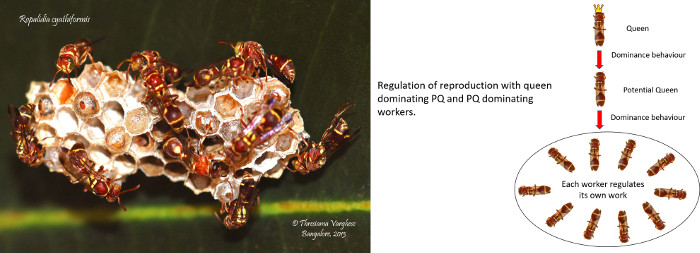Division of labour in a primitive insect society
Wed, 2021-01-27 11:54
In most social insect colonies, a single individual, the queen, is privileged to produce offspring while the rest of the members, the workers, spend their entire lives working for the welfare of the colony and rear the queen's offspring. In addition to such reproductive division of labour between the queens and her workers, sub-sets of workers divide non-reproductive labour among themselves, such as working at home versus going out to obtain food, for example. How the members of a colony agree on and bring about an efficient and conflict-free division of labour is of great interest.
In the so-called advanced societies such as honey bees, ants and termites, the reproductive division of labour is brought about by the queen's pheromones that keep the workers sterile. And the division of non-reproductive labour is brought about by decentralized, self-organization which does not require top-down control by a leader. In the so-called primitively eusocial insects, however, queen and worker roles are often interchangeable, especially in the tropics. In such species, the colony members frequently indulge in agonistic acts such as pecking, biting, chasing, lunging, and generally physically harassing each other. These dominance behaviours may hold the key to how the division of labour is regulated.
In a new studyi of the tropical primitively eusocial wasp Ropalidia cyathiformis, we find evidence that support the hypothesis that dominance behaviours regulate reproductive division of labour – the queen shows dominance behaviour to her heir (potential queen) who in turn shows dominance behaviour to the remaining colony members. Thus, the queen's status as the colony's sole reproductive and a clear line of succession upon her death is assured. Non-reproductive division of labour—who will forage and how much seems to be based on each worker's assessment of the colony's needs—neither top-down nor bottom-up but individualistic. Therefore, R. cyathiformis may represent an early stage of sociality and offer us a glimpse into the origin and evolution of the division of labour in insect societies.
iUnnikrishnan, S., and R. Gadagkar. 2021. "Dominance Behaviour and Division of Labour in the Tropical Primitively Eusocial Wasp Ropalidia Cyathiformis." Insectes Sociaux, January. https://doi.org/10.1007/s00040-020-00803-3.

Add new comment